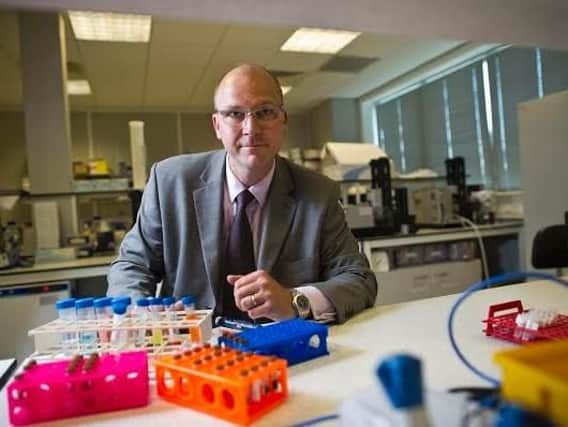Avacta in talks with pharma giants


Avacta's CEO Dr Alastair Smith said: "We are very confident that the group will deliver a least one substantial licensing deal in the near future."
The Wetherby-based firm is keen to sign multiple deals with big pharma firms. Each deal will narrow down the area of exclusivity to a particular disease or target so it can sign a number of agreements.
Advertisement
Hide AdAdvertisement
Hide AdThe group believes it is on target to come up with a possible cure for lung, breast and bowel cancer within the next 10 years.
The firm is to start human trials in 2020 to help cure cancer sufferers using its ground breaking technology. Avacta's technology is based around Affimers - the firm's high-tech alternative to antibodies.
Antibodies help fight vicious viruses or bacteria in the body by binding to them and targeting them for destruction. The problem with current cancer therapies such as chemotherapy is that they kill off all the cells in their path, not just the cancer cells.
In contrast, Affimers zone in on the cancer cells and bypass the body's healthy cells.
Advertisement
Hide AdAdvertisement
Hide AdDr Smith said the Affimer platform addresses markets worth in excess of $100bn where alternatives to antibodies are gaining significant traction.
Avacta has high hopes for two of its programmes - PD-L1 and LAG3.
In layman's terms, PD-L1 is a signal that the cancer uses to disguise itself. In effect, your own immune system then ignores the cancer.
If you can switch off the signal, your immune system can then deal with it. Avacta's PD-L1 inhibitor stops the cancer disguising itself and then the immune system can attack the cancer cells.
LAG3 gives the immune system energy.
Advertisement
Hide AdAdvertisement
Hide AdWhen your immune system is constantly attacking the tumour, it gets tired. Dr Smith said LAG3 stops it "running out of puff".
Over the past year Avacta said it has made great strides by combining PD-L1 and LAG3.
When you combine LAG3 with PD-L1, Dr Smith said you get a much more efficacious drug than one of them on their own and the group has made huge progress over the last year.
The latest development is a major therapeutic partnership with Tufts University School of Medicine in Boston, Massachusetts, which is renowned as one of the world's best medical research institutions for clinical medicine.
Advertisement
Hide AdAdvertisement
Hide Ad"Chemotherapy uses very well established drugs, but they have nasty side effects," said Dr Smith.
"With Tufts, we are only targeting cancer cells. We will use PD-L1 to target a chemotherapy to the cancer. When the chemotherapy acts on the cancer, it creates a big inflammatory response, so the immune system attacks it.
"It's completely novel. We have patented it with Tufts and we have all the commercial rights. We are working with a toxin that Tufts has in the cupboard. The pharma companies have unequivocally said that it is really interesting."
Avacta and Tufts will start in-vitro tests next year and will build up the data before human trials in 2020.
Advertisement
Hide AdAdvertisement
Hide AdIn addition to lung, breast and bowel cancer, Avacta is hoping to find cures for renal (kidney) cancer, colorectal (bowel) cancer, skin cancer and leukemia.
Avacta reported a loss from continuing operations of £8.8m in the year to July 31, reflecting accelerating R&D investment.
Analyst Mark Brewer at FinnCap said: "With shorter-term licensing activity within Avacta's non-therapeutics activities expected in 2018/2019, we consider the risk reward profile to be skewed significantly to the upside given the current EV of £12m.
"We expect plenty of news flow over the balance of 2018 and into 2019, with non-therapeutic licences, proof of concept data from its partnerships and progress of data packages for PD-L1/LAG-3 and the AfDC."